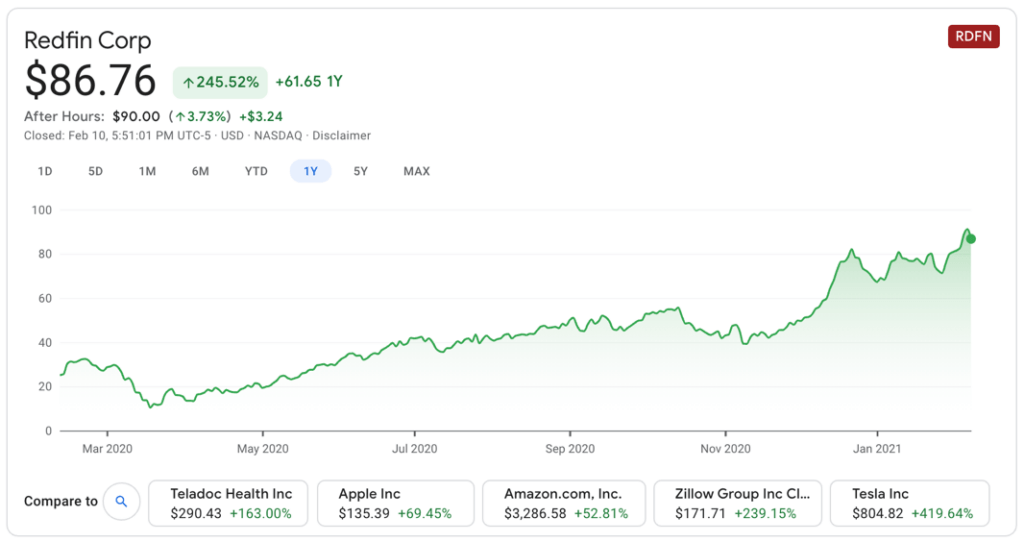Redfin: The Dream Quarantine Makeover

Dive into how the tech enabled real estate brokerage site prepared itself for the surprising Covid housing boom.
Description: Dive into how the tech enabled real estate brokerage site prepared itself for the surprising COVID housing boom.
Company Background
“Redfin is a technology-powered residential real estate brokerage” [1]. The company is self-proclaimed as providing the “modern way to buy or sell a home” driven by a technology focused platform reaching various points in the stages of real estate sales. The technology is not the only aspect of the intended disruption, Redfin prides itself on the having their own agents and tech engineers paired to the immersive online experience, unlike most competitors at the time of the IPO in 2017.
Surge in Housing Demand
In 2020, the initial hit of the COVID pandemic created concerns about another blow to the housing market. To the surprise of many analysts, there was instead a “house-hunting bonanza that gripped many Americans” [2]. Despite the loss of millions of jobs, house hunters ran to online platforms like Zillow and Redfin. The likely causes of this attraction are A) remote work options and B) millennials reaching the average age to become a first-time home buyer.
- Remote Work Options – While remote work has been growing in popularity over the recent years (in tech firms especially), the pandemic forced white collar employers to allow their employees to work from home. This ultimately has led to the ability to work anywhere and young professionals have begun to flee to the suburbs. The next level of this flee has been out of state to states with better costs of living. People and their companies are realizing that they can live anywhere to get work done and they can enjoy their home more without being tethered to the office.
- First Time Buyers – Median age of m This is seen in the massive amounts of purchases but much less sellers. Highest level since 2006. Online searches grew 13% which exhibits a dramatic acceleration.
COVID POSITIONING
Doing well in the pandemic is really about being able to meet the digital customer where they are.
Millennials are now at the home buying age (32yrs). This is important because millennials require app friendly platforms to make the process more accessible.
Redfin has led the way in creating digital insights and processes that were well suited for a COVID environment. For example, Redfin offers virtual tours, robust mobile app, tech enabled platform, “instant buying”, as well as concierge services to get houses staged for listings.
Virtual tours are beginning to replace the need for in-person tours. Potential buyers can get what they need from the 3D visualizations and high-tech camera usage instead of spending their weekend traveling across town and putting themselves at risk of coming into contact with the virus.
Another aspect that is attract to the millennial is that Redfin is capturing more of the real estate transaction. With Redfin as the broker, the agent, and the engineer, customers can lessen the amount of parties they have to deal with in order to close on a home.
Current Results
The Redfin stock has soared over the last year. See the figure below:
Sources:
[1] https://www.sec.gov/Archives/edgar/data/1382821/000119312517219877/d325499ds1.htm
[2] https://fortune.com/2020/10/20/real-estate-coronavirus-pandemic-home-buying-zillow-redfin/
[3] https://www.fool.com/investing/2020/11/16/how-redfin-is-navigating-the-coronavirus-pandemic/
[4] https://press.redfin.com/about?c=252734&p=irol-about




Shekeyla – great article! In addition to your strong points I have long believed that the listing and closing agents have taken too large a share of a home sale (5-6%) relative to the value they provide. They hold a lot of regulatory sway which has weakened efforts to displace them but the pandemic provided the catalyst needed for people to seriously rethink the whole home buying process. Will be interesting to see when that other shoe drops!
Although I truly believe our society is only at the start of the digital transformation, I am not convinced Redfin will be able to continue its 2020 growth rate. Obviously, the pandemic forced us to change our habits, our way of doing things and there clearly was a wave Redfin could surf on.
If you think about buying/ selling a house, however, this is a transaction with a high perceived cost, a high perceived benefit and where many people only have limited prior experience. As such, many customers do want the advice of a trustworthy and knowledgeable 3rd party, even if expensive and with a lot of information available on the internet. That is why I tend to believe customers will prefer to visit any targeted properties again as soon as sanitary conditions allow and meet their advisers in person instead of through an online platform.
I really like your article! I truly believe that Redfin is revolutionizing an industry that is ripe for disruption. Traditionally, real estate agents were the gatekeepers for buyers/sellers. They were overcharging customers as Merill mentioned and often did not share enough information on comparable listings/ properties and on the characteristics of certain neighborhoods. Tools such as Redfin really help customers have a better understanding of different options and comparables with all the features that they care about (info about the neighborhood, previous transactions, etc.). Unlike Tim, I actually believe that the convenience of the process and available information that Redfin and other real estate websites offer is quite valuable for customers who traditionally did not have access to such info.
It is also important highlighting that Redfin relies heavily on data analytics for a lot of customer interactions as well as its internal operations: for example, an algorithm allocated agents to clients based on schedule, past experience, and customer satisfaction levels. Metrics such as closing rate and time were also tracked to evaluate the performance of different agents.
Redfin is definitely a disruptor fueled by the pandemic.
Great article! I am also thinking that features like 3D visualization / virtual tours are nice-to-haves, but I don’t really see them being very compelling features for such high-cost transactions post-covid. Only repeat home buyers might find value in those features, but for first time home buyers, services like low listing fees are the biggest differentiation.
Therefore, I am a bit worried that the barriers to entry in this digital-driven real estate sector are actually quite low. Traditional real estate agencies, with a strong reputation, might easily try to replicate Redfin’s value proposition, harming its market share in the long run. So I think that unfortunately, this 2020 success was more of a one-time temporary win.